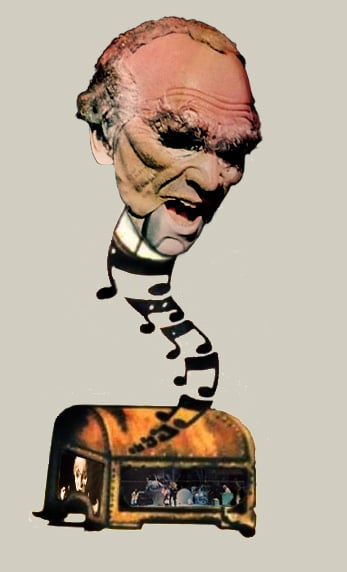Progarchives.com has always (since 2002) relied on banners ads to cover web hosting fees and all.
Please consider supporting us by giving monthly PayPal donations and help keep PA fast-loading and ad-free forever.
/PAlogo_v2.gif) |
|
Post Reply 
|
Page <1234 11> |
| Author | |||
darksideof 
Forum Senior Member 

Joined: February 22 2007 Location: Newark N.J. Status: Offline Points: 2318 |
 Posted: August 25 2008 at 16:09 Posted: August 25 2008 at 16:09 |
||
|
Very good insight and laborious!! you persuade me so much that I Agree with you 100%. that was the problem that I had the first time I heard dream Theater back in the early 90's every band that had the tag as progressive I used to do heavy source and I expect it to like them . because It suppose to be "progressivee" but when I heard Dream theater I really liked them not because they were progressive but because they were heavy and Metal I nevre really seen them as progressive rock band. to me progressive music was what was made in the 70's. and as you explained. it.....
Edited by darksideof - September 01 2008 at 13:34 |
|||
|
http://darksideofcollages.blogspot.com/
http://www.metalmusicarchives.com/ https://www.facebook.com/pages/Darksideof-Collages/ |
|||
 |
|||
Greg W 
Forum Senior Member 

Joined: August 24 2004 Location: Chicago Status: Offline Points: 3904 |
 Posted: August 25 2008 at 16:25 Posted: August 25 2008 at 16:25 |
||
|
Whew...long winded. I see the genre debate still wages on. Perhaps we need another 50 sub genres to define things better such as Progeressive PostZhuel Inflated Love Doll You Do The Math EuroKraut Rock!!
Progressive rock=overblown pomp
Progressive Metal= Overblowner Pompiness
Of course, I would have it no other way as I love them both.
Actually, just having a bit of fun. Good Write T.
|
|||
 |
|||
MikeEnRegalia 
Special Collaborator 

Honorary Collaborator Joined: April 22 2005 Location: Sweden Status: Offline Points: 20667 |
 Posted: August 25 2008 at 17:10 Posted: August 25 2008 at 17:10 |
||
|
Great post, Teo!
 Of course I agree 100%. Prog Metal is like the evil twin of Prog Rock ... like Dr. Jekyll and Mr. Hyde.   
|
|||
 |
|||
pilgrim 
Forum Newbie 

Joined: January 05 2008 Location: Brazil Status: Offline Points: 2 |
 Posted: August 25 2008 at 19:04 Posted: August 25 2008 at 19:04 |
||
|
First of all, indeed a very interesting read.... Many would get confused by the 'progressive' term that compose both 'progressive rock' and 'progressive metal' labels...
In any case, the real issue that makes these kind of discussion really long is the good-old tendency of trying to put a label in each and every band... Every band/artist/performer need to fit into one of the existing labels, or a new one will be created for that purpose... As Ian Anderson stated, he never understood people that would consider Jethro Tull as a progressive rock band, when according to him Tull had maybe release a few albuns that could be considered a progressive rock album... Same goes to the gray areas and difficulties on labeling one band or another as hard rock or heavy metal and many other genres.... I believe there are two ways to look into that... Either we live with the labels and understand that this is not a black-and-white kind of thing.... Progressive Metal is not a Progressive rock child and bands/artists/songs won't always fit perfectly in one of the pre-conceived rock genres.... Or we forget the labels alltogether... I like the latter one better.... PS: I think Crimson released a couple of (amazing) metal songs in Red. |
|||
|
If the future's looking dark,
We are the ones who have to shine If there is no one in control, We are the ones who draw the line |
|||
 |
|||
LeInsomniac 
Forum Senior Member 
Joined: December 22 2006 Location: Portugal Status: Offline Points: 315 |
 Posted: August 25 2008 at 21:33 Posted: August 25 2008 at 21:33 |
||
|
Well, T you made a great point with that enormous, but truth-telling post. As long as we in this site DON'T even think in adding Metallica do prog-metal sub-genre, (just my two cents
 ) it's all good people. Lets just discuss ) it's all good people. Lets just discuss Edited by LeInsomniac - August 25 2008 at 21:38 |
|||
 |
|||
moodyxadi 
Forum Senior Member 

Joined: November 01 2005 Location: Brazil Status: Offline Points: 417 |
 Posted: August 25 2008 at 23:17 Posted: August 25 2008 at 23:17 |
||
|
finally, two truths that people here are not sure to admit: prog rock died in the late seventies and prog metal is a metal form of music, not prog rock with distortion. Someone suggested that this site could enlarge its definition: a site that leads with prog rock, prog metal and modern adventurous music. Or restrain its contents. Miles Davis anyone...
|
|||
|
Bach, Ma, Bros, Déia, Dante.
|
|||
 |
|||
Manuel 
Forum Senior Member 

Joined: March 09 2007 Location: United States Status: Offline Points: 12468 |
 Posted: August 25 2008 at 23:48 Posted: August 25 2008 at 23:48 |
||
|
I love your comments and insight. It is indeed very important to know the difference, so we can know the bands and the kind of music they play. I personally like to know the difference, to know if I should even buy a CD.
|
|||
 |
|||
Certif1ed 
Special Collaborator 

Honorary Collaborator Joined: April 08 2004 Location: England Status: Offline Points: 7559 |
 Posted: August 26 2008 at 03:03 Posted: August 26 2008 at 03:03 |
||
Edited by Certif1ed - August 26 2008 at 03:50 |
|||
|
The important thing is not to stop questioning.
|
|||
 |
|||
Avantgardehead 
Forum Senior Member 
Joined: December 29 2006 Location: Dublin, OH, USA Status: Offline Points: 1170 |
 Posted: August 26 2008 at 05:36 Posted: August 26 2008 at 05:36 |
||
 Tons of prog metal bands fit my definition. I've heard plenty of things that are labeled prog metal and fit that formula to a T. |
|||
|
http://www.last.fm/user/Avantgardian
|
|||
 |
|||
laplace 
Prog Reviewer 

Joined: October 06 2005 Location: popupControl(); Status: Offline Points: 7606 |
 Posted: August 26 2008 at 06:22 Posted: August 26 2008 at 06:22 |
||
|
best thing written on the site for a long time
|
|||
 |
|||
akin 
Forum Senior Member 
Joined: February 06 2004 Location: Brazil Status: Offline Points: 976 |
 Posted: August 26 2008 at 07:28 Posted: August 26 2008 at 07:28 |
||
It is completely unfair to use this kind of rhetoric, because you quote one phrase when you want to contradict its meaning out of context and you quote previous things wrote to contradict other arguments, always out of context. If you have strong arguments, you don't need to do that. For example, I never said that bands clone older music, otherwise all the bands would be sued for plagiarism and music would end. However there is no new approach to music, since the late sixties. They fused rock with everything that was possible. It is not a matter of considering, for example, Nu Metal a new genre and saying that nobody did Prog Nu Metal in the late sixties. It is considering that rock eliminated all the "genre purity" and everything blended with rock is considered rock, so nothing new, just new melodies and harmonies. As for Metallica, they use the same approach as other heavy metal bands. Just because the tone of the guitar distortion and singing changed, it isn't true that they do something different to power chord riffs, solos and changes in tempo of the riff. Have you ever heard, let's say, Rush? If every kind of song structure was used in rock before, event free-form structures, common just to avant-garde music, why Metallica song structures were something new? They just created their own melodies and harmonies, which is what we expect from every musician, but unfortunately it doesn't happen so often as it should. And, by the way, history is written when it is happening. When anyone thinks he is knowledegable enough to call not-progressive bands that were called progressive at their time and call progressive bands that were not called progressive at their time, it is clear that you are trying to redefine the meaning of progressive, but for people who learned the term by other sources will disagree with the new meaning. Anyway, the obsession with a "magic term" to define everything the site has is similar to the obsession of the alchemists to find a formula to turn other metals in gold. As I said before, it is easier to admit that the site covers much more than prog rock and state this. Then, the prog rock fans wouldn't be pissed off because the site states clearly that are other things in the site, like jazz-rock/fusion, progressive metal, modern experimental, etc. The genres are somewhat related, but their are not the same thing and it is useless to try to call everything 'apple' if, for many people, some of the 'apples' are 'oranges'. |
|||
 |
|||
sleeper 
Prog Reviewer 

Joined: October 09 2005 Location: Entropia Status: Offline Points: 16449 |
 Posted: August 26 2008 at 11:19 Posted: August 26 2008 at 11:19 |
||
This is true, but there are many and more that dont, so put the brush and tar away please. |
|||
|
Spending more than I should on Prog since 2005
 |
|||
 |
|||
Certif1ed 
Special Collaborator 

Honorary Collaborator Joined: April 08 2004 Location: England Status: Offline Points: 7559 |
 Posted: August 26 2008 at 14:54 Posted: August 26 2008 at 14:54 |
||
I have attempted to keep everything in context - as I look back, I can't see any problems. I disputed some points you made, that's all - I'm not trying to play any sort of game - and I think my arguments are reasonably strong.
I don't really understand what you're saying here - whoever "they" are did not fuse rock with everything possible - that is patently untrue. If there is nothing new, how can there be new melodies and harmonies?
What about rhythm, form and timbre (the other 3 elements of music)?
Again, I find this a little confused - I'll try to pick out the salient points and adhere as closely as I can to the context;
1. Metallica did not use the same approach as heavy metal bands of past generations - unless I somehow misunderstand your meaning. They used 5 new approaches to the genre on each of their first 5 albums.
Can you think of precedents? There won't be many, I'm willing to bet.
While it's true they borrowed heavily, they borrowed from all across the metal spectrum, particularly concentrating on innovative bands such as Diamond Head, Bliztkrieg, Holocaust, Budgie - and punk bands too (a genre that Prog most definitely did not absorb, to go back to your earlier mysterious point about everything having already been exploited).
2. They did do something different with power chords, solos and changes in tempo of riff - again, I can't think of many precedents except, maybe, King Crimson. For example, the song "Seek and Destroy" uses what is essentially the same riff all the way through, but turns it upside down, plays it almost backwards, changes the tempo - the same developmental process used in "21st Century Schizoid Man", without actually copying the song in any way. You'll also note that some of the soloing is based (like part of the riff) on Saxon's "Princess of the Night", some on Judas Priest's "Exciter" (IIRC), and the rest... I can't remember - anyway, the point is that they successfully drew all these styles together and made their own unique style - an approach which is fundamental to Progressive Rock.
3. Naturally I've heard of Rush, and Rush took an entirely different approach... I must have missed your point here, as this seems obvious beyond belief.
4. I did not say that everything had been used in rock (in fact, I said the opposite) - my understanding is that this is what you're trying to say, and it's patently untrue to say that every song structure has been used in rock before. Maybe I misunderstand your point here, as this seems so obvious to me.
5. Not quite sure what your last paragraph is getting at - you seem to be saying that Metallica did something with their melodies and harmonies that most other rock bands don't really achieve, and this is desirable - is that a correct interpretation?
And, by the way, history is written when it is happening. When anyone thinks he is knowledegable enough to call not-progressive bands that were called progressive at their time and call progressive bands that were not called progressive at their time, it is clear that you are trying to redefine the meaning of progressive, but for people who learned the term by other sources will disagree with the new meaning.
History is not written as it happens - I do not believe that anyone diaried the development of Progressive Rock, for example! Diaried histories are actually quite rare, and anyway, are from one person's viewpoint, not from an overall perspective.
Most sources are inaccurate, which is why everyone has their own idea of what Prog is, and it's usually so vague that most people find it hard to put it into words.
All I'm trying to do is find words that describe it with a degree of accuracy, and it that means partial rewrites for clarification, then that's as it should be.
Anyway, the obsession with a "magic term" to define everything the site has is similar to the obsession of the alchemists to find a formula to turn other metals in gold. As I said before, it is easier to admit that the site covers much more than prog rock and state this. Then, the prog rock fans wouldn't be pissed off because the site states clearly that are other things in the site, like jazz-rock/fusion, progressive metal, modern experimental, etc. The genres are somewhat related, but their are not the same thing and it is useless to try to call everything 'apple' if, for many people, some of the 'apples' are 'oranges'. Of course, but some attempt at definition is better than no definition, which opens the door to the whole fruit basket - and probably a ton of vegetables too. [/QUOTE] Edited by Certif1ed - August 26 2008 at 15:03 |
|||
|
The important thing is not to stop questioning.
|
|||
 |
|||
debrewguy 
Special Collaborator 
Honorary Collaborator Joined: April 30 2007 Location: Canada Status: Offline Points: 3596 |
 Posted: August 27 2008 at 19:24 Posted: August 27 2008 at 19:24 |
||
|
If Jazz Fusion is a mix of Jazz & Rock, should JF be considered prog ?
If Krautrock was influenced by Psychedelia and politics and drugs, where is the prog element. If psychedelic influences are sufficient for "progginess", should all psychedelic bands (mostly from the 60s) be considered prog and have their own sub genre here at PA ? If progressive electronic includes many groups that would now be called "new age" or "ambient" in today's media subdivision of music, should modern "new age" and "ambient" groups have the door opened to them ? At what point does avant-garde become routine or formulaic ? and therefore no longer avant-garde ? Is it possible that a metal group be progressive or proggy ? If yes, what do the declaimers insist should be part of the musical presentation ? Moogs, Mellotrons, Hammond B3s ? Lower volume ? Obeissance to the Apocalypse in 9/8 ? Exploration of other types of Oceans ? Side long suites ? Please set out the criteria for which you would or could or should consider a musical genre progressive / Then make a comparison from your favourite groups to the Prog metal groups or ask the more informed members here for examples that match those set by your template setting prog heroes. Methinks that the contradictions will surpass those of many a religious holy book. (Complex passages ? Yes. And No. Time signatures outside of 4/4. Yes. And No. Long long multi part songs. Yes. And No. Virtuosic playing. Yes. And No. Can you see that accepting one choice only would disqualify seemingly clearly progressive groups or genres. Gentle Giant never went for 20 minute suites. Prog, are they ? The Krautrockers are not know for their technical expertise at their instruments. Prog, are they ? Rush never went for mellotrons and Hammond B3s. Prog , are they ? King Crimson never really wrote "symphonies". Prog , are they ? Using one criteria to elimate or negate a genre's claim to being prog music can be too easily applied to most genres here, and even to many bands within the other genres. If you don't like it. Say so. If, in comparison to everything else at PA that has passed the Prog test, a genre, be it Prog Metal, does not compare or match up to the rest, then present the case with specifics, and make sure that your conclusions cannot be used against other bands or genres from PA's database. Self defeat saves others time. Better to take time and save face. |
|||
|
"Here I am talking to some of the smartest people in the world and I didn't even notice,” Lieutenant Columbo, episode The Bye-Bye Sky-High I.Q. Murder Case.
|
|||
 |
|||
yesman1972 
Forum Groupie 
Joined: March 25 2007 Location: United States Status: Offline Points: 79 |
 Posted: August 28 2008 at 00:55 Posted: August 28 2008 at 00:55 |
||
|
I just wanted to clear up why Tool sounds like King Crimson. From
Aenima on, Tool has borrowed heavily from 80s Crimson. The main
similarities are reliance on mostly pentatonic scales, odd time
signatures implemented more often than more common ones, and
polyrhythms. Anyone doubt need only to listen tosongs like H.,
Lateralus, 46 and 2, The Patient, and many others, and compare them
from any 80s Crimson output.
|
|||
 |
|||
trackstoni 
Forum Senior Member 

Joined: February 23 2008 Location: Lebanon Status: Offline Points: 934 |
 Posted: August 28 2008 at 01:56 Posted: August 28 2008 at 01:56 |
||
|
but the real problem for progressive rock is metal *
what a difference between heaven and hell .
regardless , nothing in common , not even instruments used .
but i don't mind it exist for the super brains , vegeterians , and close to the edge maniacs ////////////////////////////// wow
|
|||
|
Tracking Tracks of Rock
|
|||
 |
|||
Certif1ed 
Special Collaborator 

Honorary Collaborator Joined: April 08 2004 Location: England Status: Offline Points: 7559 |
 Posted: August 28 2008 at 03:06 Posted: August 28 2008 at 03:06 |
||
|
An interesting and very dense group of questions...
|
|||
|
The important thing is not to stop questioning.
|
|||
 |
|||
MikeEnRegalia 
Special Collaborator 

Honorary Collaborator Joined: April 22 2005 Location: Sweden Status: Offline Points: 20667 |
 Posted: August 28 2008 at 03:22 Posted: August 28 2008 at 03:22 |
||
That's why I think it is impossible to write a definition which can be used to determine whether something is prog or not. In fact I think that an extensive checklist of elements and characteristics is the best that can be done ... in the end - like you said - whether a band is prog or not depends on how they combine those elements. I don't think that you'll be able to describe this "how" in a meaningful way, which covers all that we call prog ... it's simply too diverse, this thing we call "music".  |
|||
 |
|||
Certif1ed 
Special Collaborator 

Honorary Collaborator Joined: April 08 2004 Location: England Status: Offline Points: 7559 |
 Posted: August 28 2008 at 04:31 Posted: August 28 2008 at 04:31 |
||
|
I think my "What is Prog" blog goes some way to providing a reasonable definition - so I'd disagree strongly that it's "impossible". It's only impossible if you're looking for an exact definition, because there isn't even an exact definition of what music is.
If we don't define Prog Metal at all, then there's the danger that anything could be considered part of the "genre", making such classifications useless, and the term redundant.
Why not just use the term "Heavy Metal"? Why bother subdividing it into endless categories, if these categories can't be described?
The point is not to get perfect precision, but a degree of accuracy so that the differences become apparent to a casual reader.
|
|||
|
The important thing is not to stop questioning.
|
|||
 |
|||
Avantgardehead 
Forum Senior Member 
Joined: December 29 2006 Location: Dublin, OH, USA Status: Offline Points: 1170 |
 Posted: August 28 2008 at 05:02 Posted: August 28 2008 at 05:02 |
||
music(myū'zĭk)n.
|
|||
|
http://www.last.fm/user/Avantgardian
|
|||
 |
|||
Post Reply 
|
Page <1234 11> |
| Forum Jump | Forum Permissions  You cannot post new topics in this forum You cannot reply to topics in this forum You cannot delete your posts in this forum You cannot edit your posts in this forum You cannot create polls in this forum You cannot vote in polls in this forum |